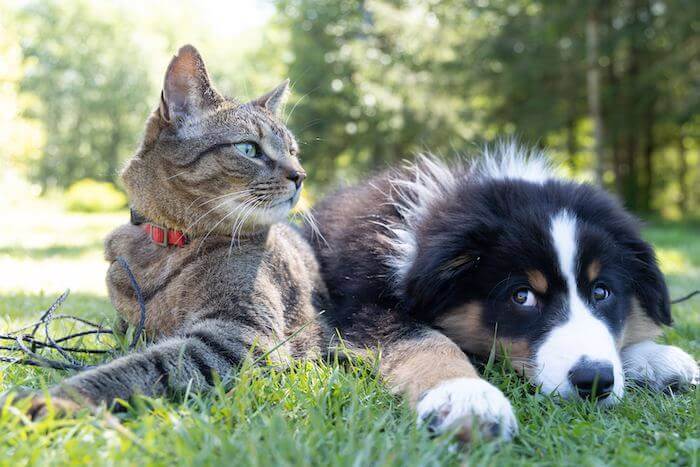
DogFoodAdvisor is reader supported See how
Dog Food Advisor is 100% impartial and is never paid to promote any brand. But if you buy using links on this page, we may earn a referral fee.
To the untrained eye, cat and dog food can look pretty similar when they’re served up side-by-side.
What’s more, if you’re lucky enough to share a home with both cats and dogs, you’ll have likely witnessed the latter quite happily chowing down on food intended for the former when given even half a chance.
These observations naturally raise the question: Can dogs eat cat food?
Is It Safe For Dogs To Eat Cat Food?
The good news is, unlike garlic, chocolate, and onions, cat food isn’t toxic to dogs.
“Generally speaking, it’s not dangerous for dogs to eat cat food, but it is dangerous for cats to eat dog food,” says Laura Ward, DFA’s in-house animal nutritionist. Therefore, parents needn’t worry if dogs finish off a whole portion of feline food.
That being said, it cannot harm to keep an eye on your dog if it happens and call the vet if you notice any worrying symptoms, such as facial swelling, itchiness, or labored breathing. If they’re especially unlucky, your dog might have ingested an ingredient to which they’re allergic.
Can Dogs Eat Wet Cat Food?
Your dog will probably love the smell of the meaty wet cat food, and if they manage to eat some, don’t panic as it’s not necessarily dangerous or harmful. However, wet cat food is made with a cat’s nutritional requirements in mind so no matter how moist and delicious, your dog will not receive a balanced diet with this food.
Can Dogs Eat Dry Cat Food?
Many pet parents prefer to mix wet and dry food for their pets. If you’re already buying dry cat food, it might seem convenient to mix it with your dog’s wet food. However, dry cat food does not provide the necessary nutritional requirements for your dog.
Can Dogs Eat Cat Food In An Emergency?
Dogs can survive on cat food if in a tough spot, but they won’t receive the nutrient balance needed. Eating cat food is likely to cause gastrointestinal upset, and if a regular occurrence, can lead to more serious conditions such as obesity or pancreatitis.
So, if asking “Should you ever feed your dog cat food?” The answer to this is no, not really. It might be stating the obvious, but cat food is uniquely formulated for a cat’s specific needs.
“Cats are obligate carnivores,” says Laura. “This means they require meat in their diet and have a higher requirement for protein and fat, as well as other nutrients — including taurine.”
Given that it’s richer and full of tasty meat, you can’t really blame your dog for having their head turned by cat food, but you shouldn’t let them indulge themselves. If you’ve ever overdone it at the breakfast buffet, you’ll know why.
What Can Happen To Dogs That Eat Too Much Cat Food?
“A dog’s nutritional requirements tend to be oversupplied by feeding cat food,” says Laura. “If an adult dog eats cat food occasionally, this isn’t usually an issue, but the oversupply of nutrients is likely to cause gastrointestinal upset in dogs with sensitive digestion.”
If these digestive woes continue for longer than 24 hours, you should give the vet a call.
Unfortunately, the problems don’t stop there.
“The oversupply of nutrients in cat food could cause weight gain and obesity in some dogs, while the higher fat would also be an issue for dogs predisposed to pancreatitis.”
Can Small Dogs Eat Cat Food?
Although they might resemble the size of a cat, it can actually be worse if a small dog regularly feeds on cat food.
Any dog can be diagnosed with pancreatitis, but breeds with a higher risk of developing the condition tend to lean on the smaller side, such as Miniature Schnauzers and English Cocker Spaniels.
Small dogs tend to benefit from food optimized for their higher rate of metabolism, and smaller physical size which is what small-breed dog foods cater for.
What’s The Difference Between Cat and Dog Food?
Just as cat food caters to the nutritional needs of cats, the same can be said for dog food and dogs.
“In contrast to cats, dogs are carnivorous omnivores, which means that their diet is more flexible,” says Laura.
Sure, this means dog food will have its fair share of meat, but there’ll usually be some carbohydrates and vegetables in the mix, too. It also tends to be less heavy in calories and fat than cat foods.
How Can I Stop My Dog From Eating Cat Food?
As many parents will know all too well, dogs can be greedy creatures and strangers to self-restraint, so cat food needs to be kept as far from intrepid snouts as possible.
Parents looking after both cats and dogs are recommended to feed them in separate rooms to avoid your dog being tempted by what’s in a cat’s bowl. If that’s not possible, you could also consider putting cats’ bowls on surfaces off the floor.
Final word
The Dog Food Advisor does not accept money, gifts, samples or other incentives in exchange for special consideration in preparing our reviews.
However, we do receive a referral fee from online retailers (like Chewy or Amazon) and from sellers of perishable pet food when readers click over to their websites from ours. This helps cover the cost of operation of our free blog. Thanks for your support.
For more information, please visit our Disclaimer and Disclosure page.
Article reviewed by
Laura Ward
Pet Nutritionist
Laura studied BSc (Hons) Animal Science with an accreditation in Nutrition at the University of Nottingham, before working for eight years in the pet food and nutrition industry.






